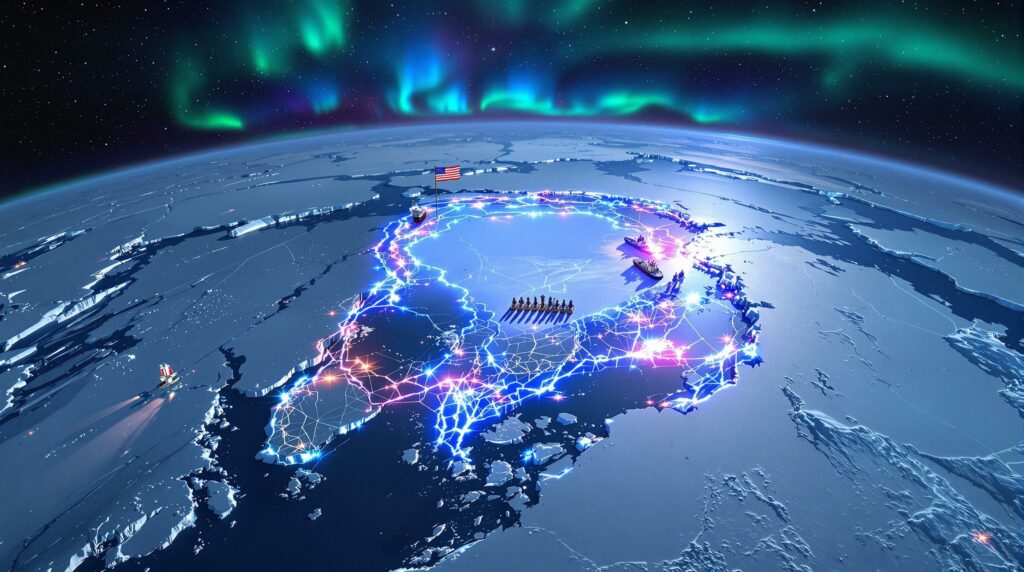What Makes Greenland So Strategically Valuable?
In recent years, Greenland has emerged as a focal point of international attention, particularly from the United States. This massive island, covering approximately 2.16 million square kilometers (almost one-third of Australia's size), holds strategic significance that extends far beyond its remote location in the North Atlantic.
The Arctic's Growing Geopolitical Importance
Climate change has dramatically transformed the Arctic landscape, creating new strategic realities that nations are racing to address. As global temperatures rise, Greenland's surrounding waters have become increasingly navigable, opening up shipping routes that were previously impassable for much of the year.
"The melting ice caps are reshaping geopolitical realities in the Arctic," explains John Mitcham, chair of the history department at Duquesne University. "What we're seeing now is similar to historical watershed moments when nations scrambled to redraw global boundaries to their advantage."
These emerging Arctic passages potentially reduce transit times between Europe, North America, and Asia by thousands of kilometers compared to traditional shipping lanes through the Suez or Panama Canals. Ships can now sail more easily through Arctic waters between Europe, Russia, and North America due to ice melting from global warming, creating new economic opportunities and security challenges.
Greenland's strategic position—just 26 kilometers from Canada and 321 kilometers from Iceland—places it as a gatekeeper for these critical maritime corridors, making control of the island a potential game-changer for global trade and military mobility.
Vast Untapped Natural Resources
Beyond its strategic location, Greenland represents one of the world's last major untapped resource frontiers. The island's geological formations harbor significant deposits of minerals essential to modern technology and defense applications.
Rare earth elements, crucial for everything from smartphones to advanced weapons systems, lie beneath Greenland's ice and rock. Greenland's critical minerals are becoming increasingly important as technological development accelerates and supply chains face growing pressures.
Additionally, geological surveys suggest substantial deposits of zinc, lead, iron ore, and uranium remain largely unexploited across the massive island. Development of these resources has progressed slowly, primarily due to the harsh Arctic conditions, complex environmental concerns, and the challenges of establishing infrastructure in remote locations.
Environmental note: Any resource extraction in Greenland must balance economic benefits with serious environmental considerations. The island's delicate Arctic ecosystem faces rapid changes from climate warming, with temperatures rising at twice the global average.
Military Strategic Positioning
From a defense perspective, Greenland offers unparalleled strategic advantages. The island hosts Thule Air Base, America's northernmost military installation, which provides critical early missile warning systems and space surveillance capabilities.
This military footprint dates back to World War II, when the United States occupied Greenland after Nazi Germany took control of Denmark. In 1949, following Denmark's entry into NATO, the U.S. formalized its military presence while acknowledging Danish sovereignty.
Greenland's proximity to Russia creates a natural buffer zone for North American defense, with the island functioning as an advanced outpost for monitoring activities across the Arctic. This positioning becomes increasingly valuable as Arctic militarization accelerates among major powers seeking to secure their interests in the warming region.
What's Behind Trump's Renewed Interest in Greenland?
Former President Trump's public statements about acquiring Greenland captured headlines worldwide, but American interest in the island stretches back more than 150 years. Understanding this historical context provides crucial insight into current geopolitical maneuvering.
Historical Context of US Interest
American interest in Greenland dates back to 1865 when Secretary of State William H. Seward first proposed purchasing both Greenland and Iceland. This initiative came shortly after Seward orchestrated the Alaska Purchase from Russia, demonstrating America's early recognition of Arctic strategic importance.
During World War II, when Nazi Germany occupied Denmark, the United States established a military presence in Greenland to prevent German control of the island. This occupation set the stage for America's continued strategic involvement in Greenland after the war ended.
In 1949, as Denmark joined NATO, the United States agreed to give up its wartime claim on Greenland while maintaining military installations through a mutual defense agreement. This arrangement has continued for decades, with the U.S. maintaining key military assets on the island while respecting Danish sovereignty.
Trump's Strategic Calculations
Trump has explicitly stated that Greenland holds critical importance for American national security. "I think Greenland is going to be something that maybe is in our future," Trump remarked, emphasizing that "the island was important for US national security."
These statements reflect the view that control of Greenland represents a strategic imperative in an era of great power competition. The former president's interest appears driven by a combination of factors: securing access to valuable resources, strengthening America's Arctic military presence, and potentially limiting the influence of rival powers in the region.
What makes Trump's interest particularly notable is its continuation despite initial diplomatic pushback. Rather than treating Greenland as a passing idea, the persistence suggests a calculated strategic vision that views the island as a long-term American interest.
Current Diplomatic Tensions
Recent diplomatic activities have heightened tensions surrounding American interest in Greenland. A U.S. delegation visit to Greenland, including Vice President JD Vance's trip to Pituffik military base, sparked significant controversy and diplomatic fallout.
Danish Foreign Minister Lars Lokke Rasmussen characterized the timing of the visit as "problematic" and showing "a lack of respect," adding: "There is no appetite for this neither in Greenland nor in the Kingdom (of Denmark) and it is therefore not good timing."
These diplomatic tensions reflect the sensitivity surrounding Greenland's status and the complex relationship between local autonomy, Danish sovereignty, and American strategic interests. Greenland's outgoing Prime Minister Mute Egede went further, labeling the U.S. delegation visit a "provocation" that undermined ongoing governance discussions within Greenland.
How Have Denmark and Greenland Responded?
The prospect of American acquisition has generated strong and unified opposition from both Greenland and Denmark, with political leaders and citizens expressing clear resistance to the idea.
United Opposition to US Acquisition
Public sentiment in Greenland remains overwhelmingly against becoming part of the United States. According to February 2025 polling, approximately 85% of Greenlanders oppose U.S. acquisition, with nearly half viewing Trump's interest as a direct threat to their sovereignty and way of life.
This opposition extends across the political spectrum. All five political parties in Greenland's parliament have explicitly rejected the possibility of becoming part of the United States, demonstrating rare political unity on this issue despite differences on other matters of governance.
Denmark's government has been equally clear in rejecting any possibility of selling Greenland. Danish officials have consistently emphasized that Greenland is not for sale, highlighting that such decisions would ultimately rest with Greenland's people under the current self-governance framework.
Political Fallout from Recent US Delegation
The timing of recent U.S. delegations to Greenland has created significant political complications. The visits occurred during sensitive coalition formation discussions following Greenland's elections, fueling concerns about external interference in local governance.
Jens-Frederik Nielsen, leader of Greenland's Democratic Party, issued a call for political unity against external pressure, stating: "We must not be forced into a power game that we ourselves have not chosen to be a part of." This sentiment reflects growing concern about Greenland becoming a pawn in great power competition rather than determining its own future.
Local reactions extended beyond political statements, with planned visits by U.S. officials to cultural events reportedly canceled due to protests. These developments indicate the depth of local resistance to perceived American overtures toward acquiring the island.
Greenland's Push for Self-Determination
The controversy occurs against the backdrop of Greenland's ongoing journey toward greater autonomy. Once a Danish colony until 1953, Greenland established its first government in 1979 with extensive self-governing rights, marking a significant step toward self-determination.
This autonomy expanded further in 2009 when Greenlandic became the official language, replacing Danish. Under the current arrangement, Greenland maintains control over many domestic affairs while Denmark retains authority over foreign policy, defense, national security, judicial affairs, and the monetary system.
Many Greenlanders view the question of their future as one to be decided internally, not through negotiations between Washington and Copenhagen. This perspective frames American acquisition interest as potentially undermining decades of progress toward greater Greenlandic self-governance.
How Does Greenland Fit Into Global Power Dynamics?
Greenland's strategic significance extends beyond U.S. interests, placing the island at the center of evolving great power competition in the Arctic. This competition involves not only the United States but also Russia, China, and the broader NATO alliance.
Russia's Arctic Ambitions
Russian President Vladimir Putin has publicly addressed U.S. plans regarding Greenland, characterizing Trump's interest as "serious plans" with "long-standing historical roots" rather than "some extravagant talk." This assessment suggests Russia views American interest in Greenland as part of a coherent strategic vision rather than a casual proposal.
Putin has stated his government is "prepared to defend its interests in the Arctic if NATO member nations were to use the region as a 'springboard for possible conflicts.'" This warning highlights how Greenland's strategic position influences broader Arctic security dynamics and Russia's perception of potential threats.
Russia's own Arctic ambitions include establishing military dominance along its northern coast, securing access to shipping lanes, and developing the region's substantial resources. Any change in Greenland's status would directly impact these strategic objectives, making it a matter of significant concern for Moscow.
China's Growing Arctic Influence
While not an Arctic nation in geographic terms, China has actively pursued influence in the region through its self-designation as a "near-Arctic state" and through strategic investments. Greenland has been a particular focus of Chinese economic interest, especially regarding the island's mineral resources.
China's "Polar Silk Road" initiative aims to integrate Arctic shipping routes into its broader Belt and Road strategy, potentially revolutionizing trade patterns between Asia and Europe. Greenland's position makes it a crucial node in these proposed routes, explaining Chinese interest in establishing footholds on the island.
Several proposed Chinese investments in Greenland have raised security concerns in Denmark and the United States, leading to increased scrutiny of foreign investment in critical infrastructure and resources. These concerns reflect growing awareness of how economic engagement can translate into strategic influence.
NATO Strategic Considerations
Greenland's position is integral to NATO's northern defense strategy, providing early warning capabilities and monitoring of Russian military activities. The Thule Air Base represents a critical asset for North American security, making any change in Greenland's status a matter of alliance-wide concern.
Climate change is creating new security challenges in the Arctic that NATO must address. As sea ice retreats, previously inaccessible areas become potential vectors for security threats, requiring adaptation of defense strategies and capabilities throughout the region.
NATO has responded to increasing militarization of the Arctic with expanded exercises and enhanced coordination among Arctic member states. Greenland's role in these evolving security arrangements remains central, particularly as tensions between NATO and Russia continue to develop in the region.
What Are Greenland's Key Geographic and Demographic Features?
Understanding Greenland's unique characteristics provides essential context for grasping its strategic significance and the complexities surrounding its governance and future.
Physical Characteristics
As the world's largest island, Greenland covers approximately 2.16 million square kilometers—an area comparable to about one-third of Australia. This massive landmass is situated between the North Atlantic and Arctic Oceans, with two-thirds of the island lying above the Arctic Circle.
Greenland's unique positioning creates extraordinary natural phenomena, including the midnight sun. From May 25 to July 25, the sun does not set in Greenland, with June 21 celebrated as a national holiday marking the longest day of the year.
The island's proximity to North America—just 26 kilometers from Canada—and relative closeness to Iceland (321 kilometers) creates natural connections to both continents despite its political ties to Europe through Denmark.
Population and Governance
Greenland maintains a unique governance structure that reflects its history and evolving political status. Once a Danish colony until 1953, when it was redefined as a district of Denmark, Greenland established its first government in 1979 with extensive self-governing rights.
The island's governance continues to evolve, with Greenlandic becoming the official language in 2009, replacing Danish. This change reflected growing cultural autonomy and national identity distinct from Denmark's.
Under current arrangements, Denmark owns and runs Greenland as a semi-autonomous territory. While Greenland exercises significant control over domestic affairs, Denmark retains authority over foreign policy, defense, national security, judicial and legal affairs, and the monetary system.
Climate and Environmental Significance
Greenland stands at the frontline of climate change, experiencing warming at a rate significantly higher than global averages. This warming has profound implications not only for Greenland's environment but for global climate systems.
The island's economy primarily relies on fishing and grants from Denmark, with climate change potentially transforming economic opportunities through increased resource accessibility while simultaneously threatening traditional ways of life.
Greenland's colonial history officially began with Norwegian priest Hans Egede who arrived in 1721, establishing European settlement that would eventually lead to Danish control. This history continues to influence contemporary discussions about identity, governance, and self-determination.
What Are the Legal Implications of US Acquisition Attempts?
Any attempt to transfer Greenland from Danish to American sovereignty would face complex legal, diplomatic, and ethical challenges that extend far beyond simple financial transactions.
International Law Considerations
Modern international law strongly discourages territorial acquisition without consent of the affected population. This principle, enshrined in numerous international agreements and conventions, would create significant legal obstacles to any unilateral acquisition attempt.
Greenland's status as part of a NATO member state adds additional complexity. The North Atlantic Treaty establishes mutual defense obligations among members, making any forcible acquisition attempt particularly problematic from a legal and alliance perspective.
Indigenous rights protections under international law provide additional safeguards for Greenland's predominantly Inuit population. These protections establish rights to self-determination and cultural preservation that would need to be addressed in any potential sovereignty change.
Historical Precedents
While the United States has historically purchased territories from foreign powers—most notably Alaska from Russia and the Louisiana Territory from France—these transactions occurred in vastly different historical contexts before modern international norms were established.
The post-World War II settlement established Greenland's current governance structure, with the United States agreeing in 1949 to recognize Danish sovereignty while maintaining military installations through mutual defense agreements.
This arrangement has proven relatively stable for decades, suggesting that dramatic changes would require exceptional circumstances and multilateral agreement rather than bilateral negotiations between the U.S. and Denmark alone.
Diplomatic Pathways
Any legitimate transfer of sovereignty would require approval at multiple levels: from Denmark's government, Greenland's self-governing authorities, and Greenland's people through democratic processes. The current political climate makes achieving consensus at all these levels highly improbable.
Economic incentives, while potentially substantial, would need to address long-term development, resource rights, citizenship status, and governance transitions. The complexity of these issues extends far beyond simple financial transactions.
Given current political realities—with unified opposition from Greenland's political parties, overwhelming public opinion against acquisition, and Denmark's consistent rejection of the idea—diplomatic pathways to American acquisition appear effectively closed for the foreseeable future.
FAQs About US Interest in Greenland
Could the US legally purchase Greenland?
While technically possible with Danish and Greenlandic consent, current political realities make this extremely unlikely. All major political parties in Greenland oppose such a move, and Denmark has repeatedly rejected the possibility. Recent polling shows approximately 85% of Greenlanders oppose becoming part of the United States, creating insurmountable political obstacles to any purchase agreement.
What resources in Greenland interest the US most?
Rare earth elements, crucial for technology manufacturing and defense applications, represent the most strategically valuable resources in Greenland. The island also contains substantial deposits of zinc, lead, iron ore, and uranium market dynamics add complexity to the resource equation. Additionally, offshore oil and gas potential adds to Greenland's resource significance, though development has been limited by harsh conditions and environmental concerns.
How do Greenlanders feel about US acquisition?
According to February 2025 polling, approximately 85% of Greenlanders oppose becoming part of the United States, with nearly half viewing Trump's interest as a direct threat to their sovereignty. All five political parties in Greenland's parliament have explicitly rejected the possibility of American acquisition, demonstrating rare political unity on this issue.
What is Russia's position on US interest in Greenland?
Russian President Vladimir Putin has characterized Trump's interest in Greenland as "serious plans" with "long-standing historical roots" rather than casual interest. Putin has warned that Russia is "prepared to defend its interests in the Arctic if NATO member nations were to use the region as a 'springboard for possible conflicts,'" indicating that Russia views potential US control of Greenland as a significant security concern.
How would US acquisition of Greenland affect global politics?
US control of Greenland would fundamentally alter Arctic power dynamics, potentially increasing tensions with Russia and China while strengthening America's strategic position in the region. Such an acquisition would likely damage US relations with European allies, particularly Denmark and other Nordic nations, while raising questions about respect for self-determination principles in international relations.
Disclaimer: This article presents analysis based on current information and historical context. Future developments in Arctic geopolitics, climate change impacts, and international relations may significantly alter the strategic calculus surrounding Greenland. Readers should consider this analysis as a snapshot of current conditions rather than predictions of future outcomes.
The growing importance of energy transition security makes Greenland's resources increasingly valuable on the global stage, while the European Union has developed its own [European raw materials strategy](https://discoveryalert.com.au/news
Ready to Spot the Next Major Mineral Discovery?
Stay ahead of the market with Discovery Alert's proprietary Discovery IQ model, which delivers real-time notifications on significant ASX mineral discoveries, transforming complex data into actionable investment insights. Visit our discoveries page to understand why historic mineral discoveries have generated substantial returns and begin your 30-day free trial today.




